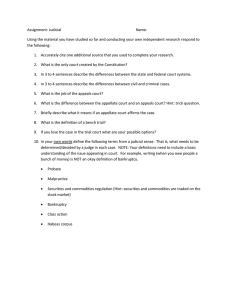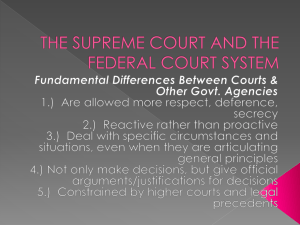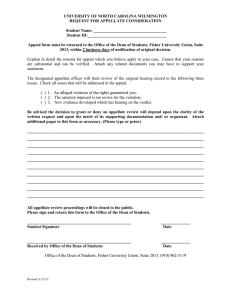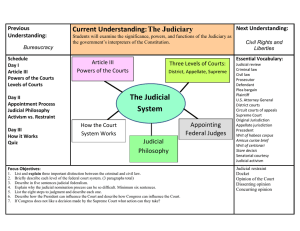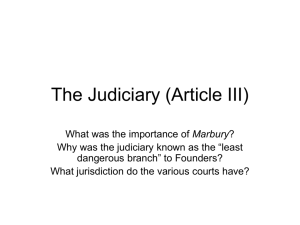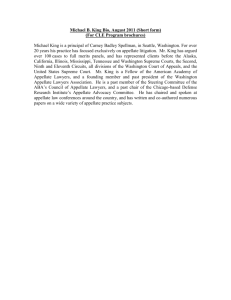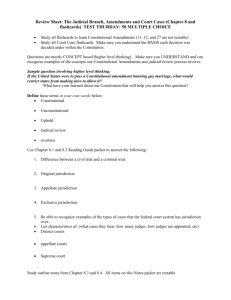UPDATE Appellate Briefs Taking Notice on Appeal
advertisement
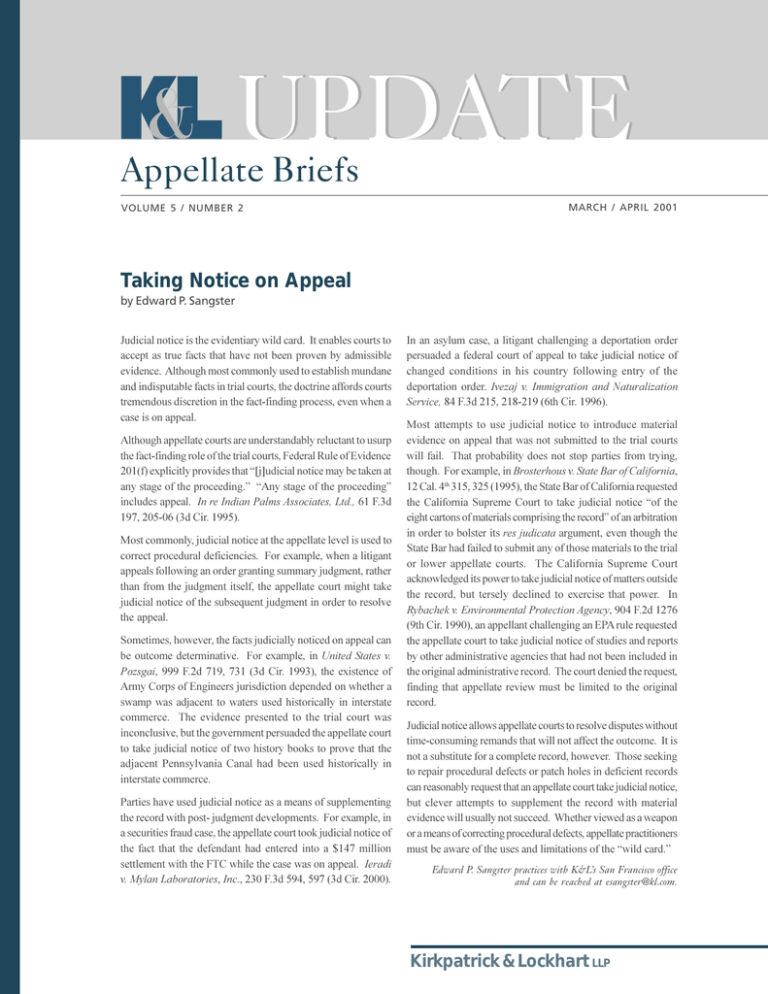
UPDATE Appellate Briefs VOLUME 5 / NUMBER 2 MARCH / APRIL 2001 Taking Notice on Appeal by Edward P. Sangster Judicial notice is the evidentiary wild card. It enables courts to accept as true facts that have not been proven by admissible evidence. Although most commonly used to establish mundane and indisputable facts in trial courts, the doctrine affords courts tremendous discretion in the fact-finding process, even when a case is on appeal. Although appellate courts are understandably reluctant to usurp the fact-finding role of the trial courts, Federal Rule of Evidence 201(f) explicitly provides that [j]udicial notice may be taken at any stage of the proceeding. Any stage of the proceeding includes appeal. In re Indian Palms Associates, Ltd., 61 F.3d 197, 205-06 (3d Cir. 1995). Most commonly, judicial notice at the appellate level is used to correct procedural deficiencies. For example, when a litigant appeals following an order granting summary judgment, rather than from the judgment itself, the appellate court might take judicial notice of the subsequent judgment in order to resolve the appeal. Sometimes, however, the facts judicially noticed on appeal can be outcome determinative. For example, in United States v. Pozsgai, 999 F.2d 719, 731 (3d Cir. 1993), the existence of Army Corps of Engineers jurisdiction depended on whether a swamp was adjacent to waters used historically in interstate commerce. The evidence presented to the trial court was inconclusive, but the government persuaded the appellate court to take judicial notice of two history books to prove that the adjacent Pennsylvania Canal had been used historically in interstate commerce. Parties have used judicial notice as a means of supplementing the record with post- judgment developments. For example, in a securities fraud case, the appellate court took judicial notice of the fact that the defendant had entered into a $147 million settlement with the FTC while the case was on appeal. Ieradi v. Mylan Laboratories, Inc., 230 F.3d 594, 597 (3d Cir. 2000). In an asylum case, a litigant challenging a deportation order persuaded a federal court of appeal to take judicial notice of changed conditions in his country following entry of the deportation order. Ivezaj v. Immigration and Naturalization Service, 84 F.3d 215, 218-219 (6th Cir. 1996). Most attempts to use judicial notice to introduce material evidence on appeal that was not submitted to the trial courts will fail. That probability does not stop parties from trying, though. For example, in Brosterhous v. State Bar of California, 12 Cal. 4th 315, 325 (1995), the State Bar of California requested the California Supreme Court to take judicial notice of the eight cartons of materials comprising the record of an arbitration in order to bolster its res judicata argument, even though the State Bar had failed to submit any of those materials to the trial or lower appellate courts. The California Supreme Court acknowledged its power to take judicial notice of matters outside the record, but tersely declined to exercise that power. In Rybachek v. Environmental Protection Agency, 904 F.2d 1276 (9th Cir. 1990), an appellant challenging an EPA rule requested the appellate court to take judicial notice of studies and reports by other administrative agencies that had not been included in the original administrative record. The court denied the request, finding that appellate review must be limited to the original record. Judicial notice allows appellate courts to resolve disputes without time-consuming remands that will not affect the outcome. It is not a substitute for a complete record, however. Those seeking to repair procedural defects or patch holes in deficient records can reasonably request that an appellate court take judicial notice, but clever attempts to supplement the record with material evidence will usually not succeed. Whether viewed as a weapon or a means of correcting procedural defects, appellate practitioners must be aware of the uses and limitations of the wild card. Edward P. Sangster practices with K&L’s San Francisco office and can be reached at esangster@kl.com. Kirkpatrick & Lockhart LLP NOTA BENE Berke v. Bloch, 242 F.3d 131 (3d Cir. 2001), demonstrates once again the harsh consequences that arise from the failure to understand the application of the 30-day appeal period under Federal Rule of Appellate Procedure 4. Plaintiffs had sued three defendants for their involvement in an allegedly fraudulent investment solicitation scheme. On December 14, 1999, the district court entered summary judgment for one defendant, and plaintiffs appealed. Because, however, the case was still active as to the remaining two defendants, plaintiffs voluntarily withdrew their appeal, purporting to reserve a right to refile. Thereafter, on March 1, 2000, the district court dismissed the action with respect to the remaining defendants and closed the case without prejudice to reopening if settlement were not reached with the remaining defendants within 60 days (i.e., May 1, 2000). Subsequent to May 1, plaintiffs, having reached a settlement, filed stipulations of dismissal as to the remaining two defendants, and on June 21, 2000, plaintiffs again appealed from the order of December 14, 1999. The Third Circuit, in dismissing the appeal as untimely, held that while the conditional March 1 order giving the parties a deadline to conclude settlement was not final under 28 U.S.C. § 1291, it ripened into a final order when the deadline expired. Because the district court had affirmatively closed the case in its March 1 order, and because the judicial process works best when orders mean what they say, the panel deemed the stipulations of dismissal superfluous and rejected plaintiffs plea that communications with the district court had lead them to believe that the March 1 order would not be final until stipulated dismissals were entered. ON THE DOCKET In Wagner v. Professional Engineers in California Government, 2001 WL 96374 (9th Cir. February 5, 2001)(unpublished), the Ninth Circuit applied new Rule 23(f) of the Federal Rules of Civil Procedure, which gives appellate courts discretion to take interlocutory appeals of orders granting or denying class certification. Plaintiffs, non-union California state employees required to pay fees to the union representing their bargaining unit, brought suit against the union, alleging that the union failed adequately to notify them of their rights and responsibilities regarding the fee, in violation of the First Amendment. The district court denied their motion to certify a unit-wide plaintiff class. The court relied on dicta in a Seventh Circuit opinion authored by Judge Posner, in which Posner opined that there is an inherent conflict of interests between non-union employees who want to free ride on dues-paying members and others who actively hate unions and seek to destroy them. This inherent conflict made class treatment inappropriate. In an unpublished opinion, after granting the employees motion to take an interlocutory appeal, the Ninth Circuit reversed, reasoning that although Posners dicta may have merit, the district court must make findings that there actually are free riders and union haters in the proposed class, and may not simply speculate that they exist. The successful plaintiffs were represented by Dylan Carp of K&Ls San Francisco office. This Update is a bi-monthly publication of the Appellate Practice Group of Kirkpatrick & Lockhart LLP. EDITOR Andrew H. Cline CONTRIBUTING EDITOR Julia M. Glencer For more information, contact us at appeals@kl.com or at any of our offices: BOSTON 75 State Street Boston, Massachusetts 02109 617.261.3100 Rory FitzPatrick, rfitzpatrick@kl.com DALLAS 3100 Bank One Center 1717 Main Street Dallas, Texas 75201 214.939.4900 Frederick Linton Medlin, fmedlin@kl.com HARRISBURG Payne Shoemaker Building 240 North Third Street Harrisburg, Pennsylvania 17101 717.231.4500 Andrew H. Cline, acline@kl.com LOS ANGELES 10100 Santa Monica Boulevard Seventh Floor Los Angeles, California 90067 310.552.5000 Robert E. Feyder, rfeyder@kl.com MIAMI 201 South Biscayne Blvd. Suite 2000 Miami, Florida 33131 305.539.3300 Carlos M. Sires, csires@kl.com NEWARK The Legal Center One Riverfront Plaza, Seventh Floor Newark, New Jersey 07102 973.848.4000 Anthony P. La Rocco, alarocco@kl.com NEW YORK 1251 Avenue of the Americas New York, New York 10020 212.536.3900 David Simon, dsimon@kl.com PITTSBURGH Henry W. Oliver Building 535 Smithfield Street Pittsburgh, Pennsylvania 15222 412.355.6500 Robert L. Byer, rbyer@kl.com SAN FRANCISCO 100 Pine Street, Suite 3200 San Francisco, California 94111 415.249.1000 Edward P. Sangster, esangster@kl.com WASHINGTON 1800 Massachusetts Avenue, N.W. Second Floor Washington, DC 20036 202.778.9000 Dick Thornburgh, rthornburgh@kl.com www.kl.com Kirkpatrick & Lockhart LLP Challenge us. © 2001 KIRKPATRICK & LOCKHART LLP This publication is for informational purposes and does not contain or convey legal advice. The information should not be used or relied upon in regard to any particular facts or circumstances without first consulting with a lawyer.


